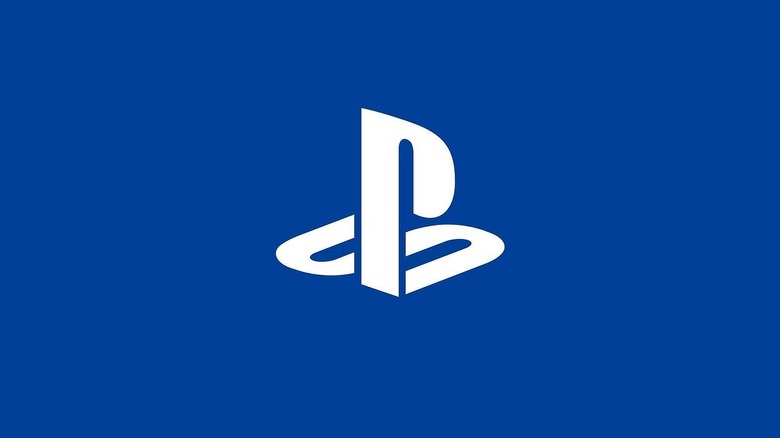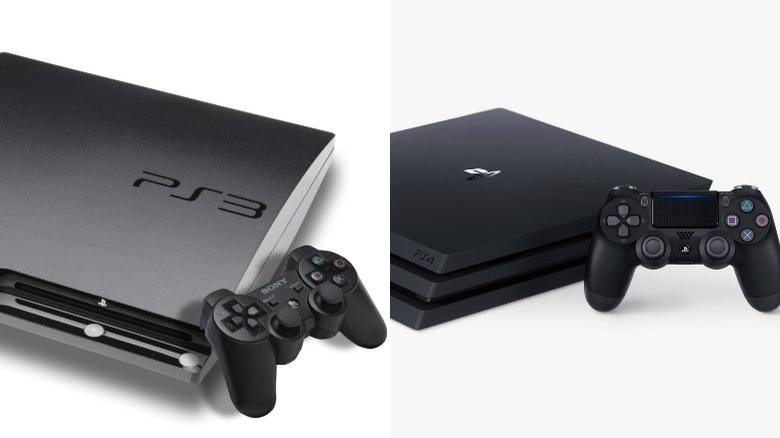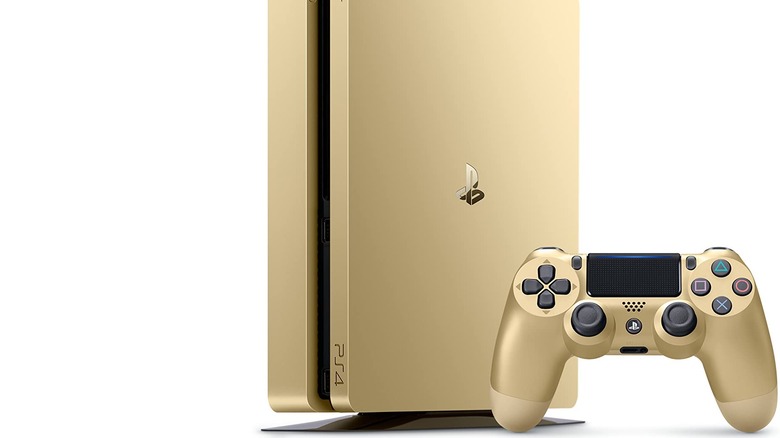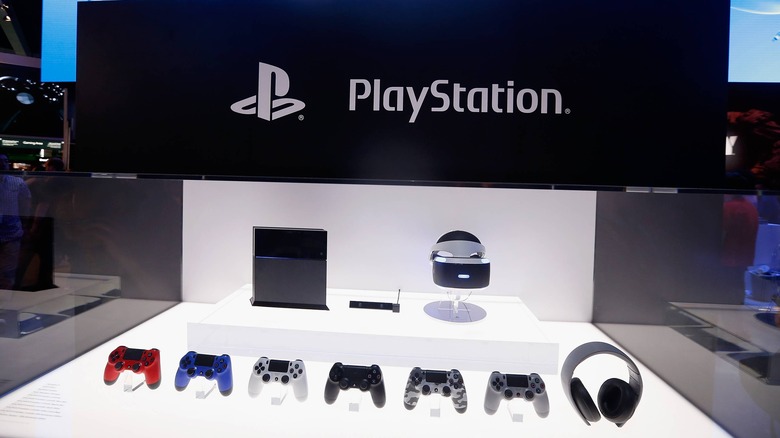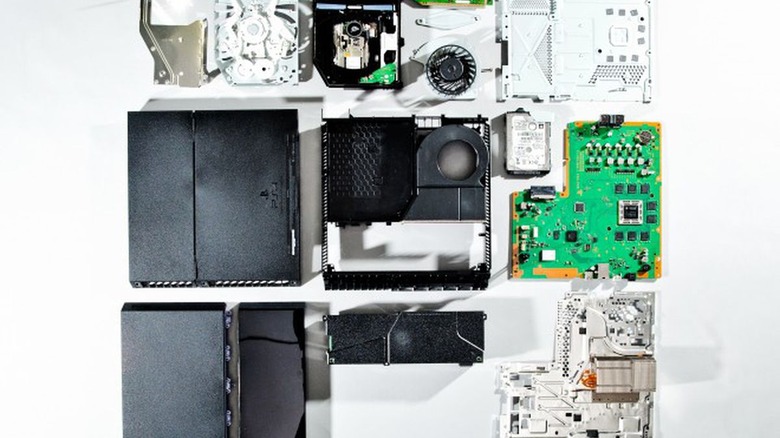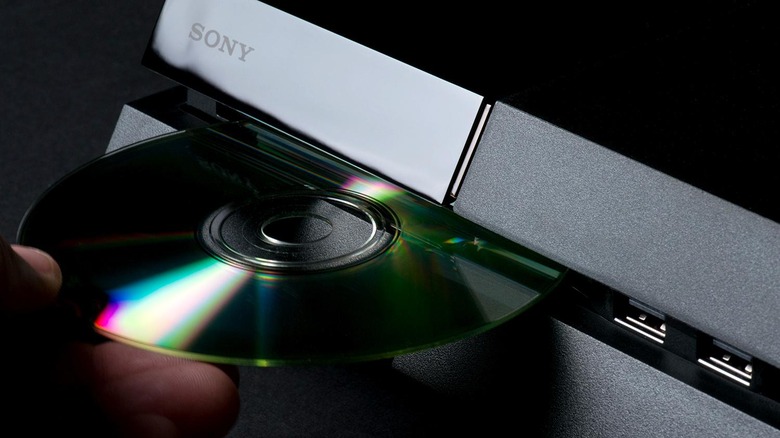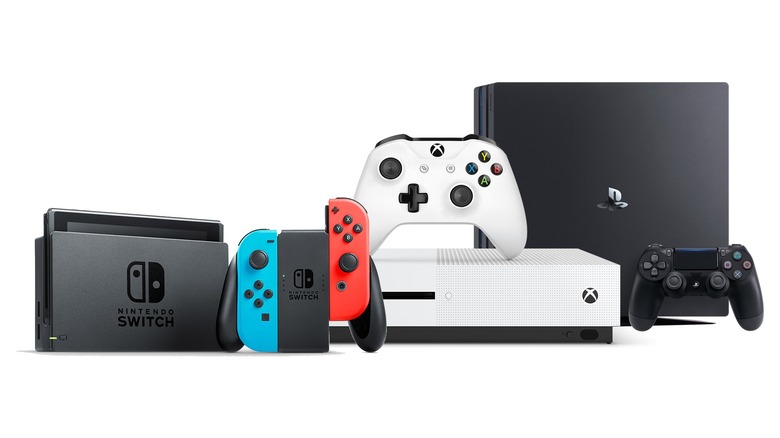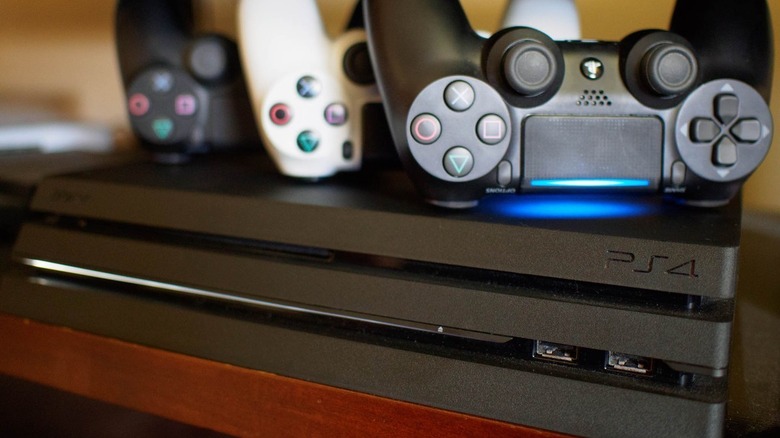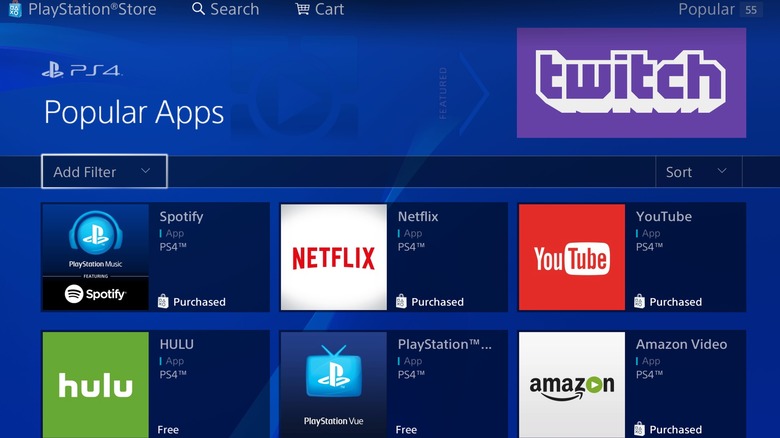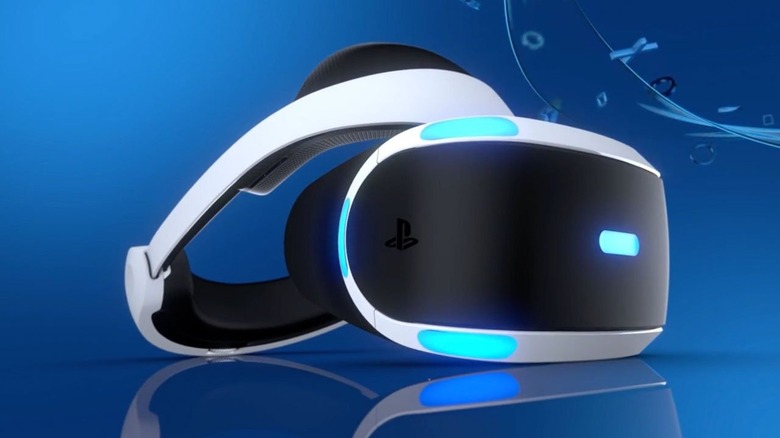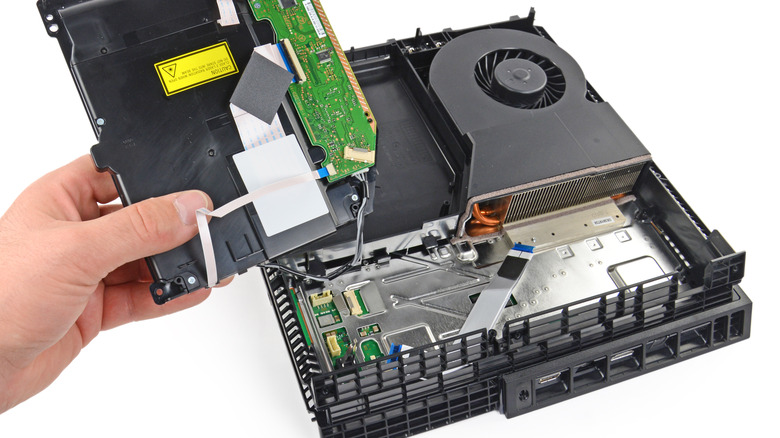Things The PS5 Needs To Avoid
The PlayStation 4 is one of the most successful consoles ever created. The numbers don't lie: when it comes to sales dominance, critical reviews of exclusives, and market penetration, Sony's console was impressive. That comes during an era when many felt consoles would begin to slowly fade away in favor of computers and mobile gaming, too.
The console generations keep chugging along, though, indifferent to all the doom and gloom that industry insiders have been hurtling in their direction for years now. Sony will likely soon introduce the world to the PlayStation 5, and it will be a machine with incredible expectations to live up to. There are a million different things the brilliant minds at Sony could conceive of to make that happen, but here, we've assembled a much more condensed list. Here's our take on the major things the PS5 needs to avoid to remain a contender in the next iteration of console gaming.
No backward compatibility
The PlayStation consoles might be the most consistent of the big three. Out of the four Sony machines that currently exist, only the PlayStation 3 wouldn't be considered a classic. Even then, it wasn't like the console was a flop; the PS3 still moved over 80 million units in its day. It just so happens that the PlayStation 1 moved over 100 million while the PlayStation 2 hit over 155 million.
The PlayStation 4 was a clear success despite existing at a time the console market was shrinking or shifting. As a result, the PlayStation 5 simply cannot afford to abstain from backward compatibility like Sony's previous console releases. Everybody understands why Sony chooses to ignore backward compatibility: it's less lucrative. The PlayStation Store has plenty of console classics to peruse on its online storefront, and people who own copies of PS3 games still buy them to be able to play them on their newer machine. In addition, putting in an earlier console's chipset alongside the modern console's set makes the whole package more expensive.
But with consoles still competing for attention, it doesn't make sense to punish people for supporting the PS4. Having a backward compatible PS5 would be a classy tip of the hat from Sony to its fans, and give people with PS4 libraries they haven't gotten around to yet a reason to feel less bad about picking up the new hotness when it arrives.
An exorbitant price tag
Consoles may be a more difficult sell than they used to be, but don't tell that to any of the major companies still producing them. Console prices have still been consistently high at launch, although Sony specifically has some reason for being wary of obvious greed. The PS3 launched with a $600 USD price tag on the high end, and it was also the last time that Microsoft and Nintendo were real competition to Sony. Once the PS4 launched with similar price points to its competitors, the landscape shifted dramatically.
For that reason, it would be wise on Sony's part to avoid any drama regarding the PS5's launch price. Naturally, cutting edge technology demands a certain premium, and nobody is expecting the console to launch for less than a few hundred dollars. With that said, though, gaming PC rigs are fairly easy to build, and mobile gaming continues to make inroads into being a genuine primary platform. With so many alternatives, Sony can't just ramp the price of its new console up and expect people to pay without considering other options.
The PS5 has the potential to continue Sony's stranglehold over the market, but it will need to be priced low enough to encourage people to pick it up early.
Complacency
This is another angle that Sony is familiar with. Following the PlayStation 2 becoming the best-selling video game console of all-time, Sony seemed to get a little complacent in its approach to its predecessor. The PlayStation 3 debuted at a shockingly high price tag and Microsoft immediately capitalized, offering the Xbox 360 for close to half the price. Although the PS3 had backward compatibility in its original versions, this was due to the fact that it had the chipsets of both a PS1 and PS2 within it as well. Naturally, that raised the price of the console, something Sony could have attempted to avoid by placing a higher priority on pushing software emulation tech within its devices.
History could repeat itself. Once again, Sony has established itself as the company to beat in the next console generation, thanks to the return to form of the PS4. The key is for Sony to continue to push hard for the PS5 to maintain a specific level of quality and finish.
While it seems silly to suggest a company could get complacent in a market as vicious as video games, there's precedent, so it's worth being concerned over. Hopefully, Sony has learned from its past mistakes. Nobody wants a repeat of what happened with the PS3 ... except, perhaps, Microsoft and Nintendo.
A looser grip on must-own exclusives
Exclusives made the PS4. The console is powerful, and has a number of different apps and features that separate it from its competitors, but let's face it: when it comes to the games industry, a console is only as good as the games people can play on it. That's especially true of the ones that can't be found anywhere else. When someone is deciding between two different devices, it's the exclusives that can be the deciding factor.
Horizon: Zero Dawn. Marvel's Spider-Man. Bloodborne. The PS4 had an incredible exclusive lineup that could, in the future, be considered one of the all-time greats. The PS5 needs to capitalize on that and continue pressing the advantage. With more games promoting cross-platform play and Sony's noted reluctance regarding that feature, it seems like exclusives will once again have to help establish the PS5 as must-own.
Fortuitously, however, having the best exclusives in one generation can often help with the next. There are a number of sequels Sony could bring to the PS5 that would hook millions of fans. Prioritizing exclusives should be one of the first selling points on the PS5, and it should begin with its launch lineup onward.
Underwhelming processing power
Sony and Microsoft have both become known for pushing innovative, powerful tech into their respective consoles. It might not always look like a drastic change on the surface, of course. The PlayStation family has remained very similar in aesthetic for three generations. Underneath the matte black exterior, though, there's always something exciting for fans of high-powered console gaming.
While Nintendo will likely maintain a rather large lead on the innovation front, Sony is still poised to cash in on its reputation for processing power. People don't expect the next PlayStation to look wildly different or offer revolutionary new ways of playing video games. That's for other companies. What fans will expect from Sony is pure power, a console capable of supporting even the most ambitious developers.
For that reason, the PS5 simply cannot afford to sacrifice processing power for smaller innovations. The PlayStation family has a reputation, and it can't easily be shaken off. If the PS5 debuts with less-than-impressive processing specs, it will turn some fans off and create a window of opportunity for competitors to capitalize on. The Switch already does creative gaming so well, and Microsoft needs to shake things up in order to compete next generation. If those two things hold true, then the PS5 simply needs to do what the PS4 did to distinguish itself: premium power, a draw for developers and fans alike.
Digital only
A digital-only console seems appealing at first glance. Who wouldn't want a system that's capable of being scaled down significantly without a disc tray to worry about? That would leave even more room for new, experimental tech, creating a machine that could push the boundaries of console gaming faster than anticipated. Microsoft has even flirted with the idea of digital-only in the past, to the praise of many fans who use digital distribution services exclusively.
The problem stems from the fact that many gamers are collectors as well. Part of the appeal of video games are the various special editions that they release, replete with goodies that show the person who bought them is a diehard fan of the property. Even without special editions, fans love to have well-stocked video game libraries they can display in their homes.
Would going digital only cause many of these fans to abandon their console of choice? That seems unlikely. But the change would have consequences. Download services can be difficult to manage: Bethesda famously caused Fallout 76 fans to churn through their monthly download limits because the game needed to be patched so often. Being unable to purchase a game until the next month because of digital-only distribution would be a nightmare, and given that so many people enjoy physical copies of games, it's one the PS5 can easily avoid.
Anti-cross platform stance
The PlayStation 4 was so absurdly popular that there really wasn't much reason for Sony to entertain the idea of the cross-platform play that was being introduced by its competitors. Even with games as popular as Fortnite, it took months of consistent performance and fan demand for Sony to cave. That's the position of power that Sony found itself in at the end of that console generation's life cycle.
The time for being staunchly against cross-platform play is over, though. Now that it's a known quantity and the PS5 will be starting over fresh, there won't be the luxury of a significant lead on sales. If two out of the three major consoles are offering cross-platform play, that could become a major issue for Sony.
While it may seem cross-platform would hurt Sony, it might actually help. If the PS5 manages to maintain a high quality with its exclusive titles, then it would also be the platform more people would want to be on. If they could still play with their friends regardless of console choice, there wouldn't need to be a tough decision made. Players could simply purchase a PS5, comfortable with a good exclusive lineup and access to their friends around the world.
Loud fans
Some decisions that Sony needs to make regarding the PlayStation 5 are extremely difficult. It's not easy to outline how to support online play without a subscription cost, for instance. Likewise, saying "innovate some technology" and actually doing it are vastly different. Before we ever get our hands on the PS5, thousands of difficult decisions will be made regarding its appearance, performance, and future.
Iterating on the PS4's fan design is not one of those difficult decisions. The original PS4 sounds like what we imagine one jet turbine screaming at another jet turbine might sound like. It's one of the loudest fans we've ever heard on a console — including some that were made ten or more years ago. It's easily one of the most annoying factors of the console.
Luckily, this one is a simple fix for Sony. Just place a bigger priority on a quieter console, and work hard to make that a reality. They pulled it off with the PS4 Slim, and there's no reason they couldn't on a first-run PS5. At least make it so that people don't need to void the warranty just to try and make it sound less like NASA is launching a rocket in their living room.
No streaming support
Streaming video games has become an important and lucrative aspect of the industry. Gamers like Ninja have made their name on committing to a popular game and becoming extraordinarily good at it, and millions of would-be superstars are eager to take their own shot at the next big thing.
Supporting that drive would be wise on Sony's part. While the PS4 had some streaming technology to help people broadcast their games on Twitch, it would be smart to make the PlayStation 5 a streaming machine as well as a top-tier console. That's likely going to fall onto the software side of things, by building several native apps that either vastly improve the streaming experience or support an entirely new platform for streaming altogether.
The one thing Sony can't do is just ignore streaming as though it isn't a major source of revenue for everyone involved. Becoming a console that attracts current and would-be streamers is a lucrative concept, and one that Sony could capitalize on as early as the release of the PS5. Streaming will only become more relevant as developers genuinely look to create watchable games, and creating a platform that not only houses those games but also those who make them popular would, once again, help cement the PS5 as the console to beat in the future.
Low-impact, expensive tech
One of the more disappointing elements of the PlayStation 4's life cycle was definitely PSVR. Virtual reality technology as a whole has been struggling to produce something relevant. Between an intimidating price point for entry and developers remaining largely focused on traditional games, virtual reality never really took off in the way many of us thought it would.
That's something that the PlayStation 5 will need to avoid: expensive, low-impact tech. A lot of resources went into developing PSVR and it's not clear whether it amounted to anything more than just something Sony did because it could. While some people remain interested in VR and the technology will certainly become relevant again at some point, the lesson learned is clear. Don't expect people to shell out a premium on technology that isn't ready to deliver something worth that cost of entry yet.
The PS5 should absolutely pursue new tech. It should also avoid flashy, expensive innovations that don't impact the overall gaming experience too significantly, though. Using that funding to instead churn out more exclusives would be a much better use of Sony's time and money, and fans would be grateful for a less expensive experience.
Locked-in hardware
We've been banging on about the end of consoles for multiple generations now, but there are a few options to make devices like the PS5 relevant well beyond their first few years on the shelf. One option would be to avoid creating a console that is locked in to its tech specifications.
We've seen it work with gaming PCs; people are more willing to shell out a lot of cash on the initial buy because they can then spend smaller amounts on upgrading it as they need to over a series of years. There's never been that luxury for console gamers. Eventually, they become irrelevant, or a newer version comes out that offers something fans want. It's a frustrating experience.
The PS5 could completely change the game for the console industry by offering an upgradable service. As technology gets better, Sony could offer updates to specific parts of the console, like video cards and RAM in gaming computers. This would also free the PS5 from the life cycles we typically expect from consoles, allowing it to become the first truly multi-generational console ever made.
Even if Sony doesn't want to go all the way down that particular road, though, it would be nice for the PS5 to avoid having all of its hardware locked in for its entire existence. Even upgrading something like its fan system would be a nice luxury to have, especially given the pedigree of Sony's cooling systems thus far.

